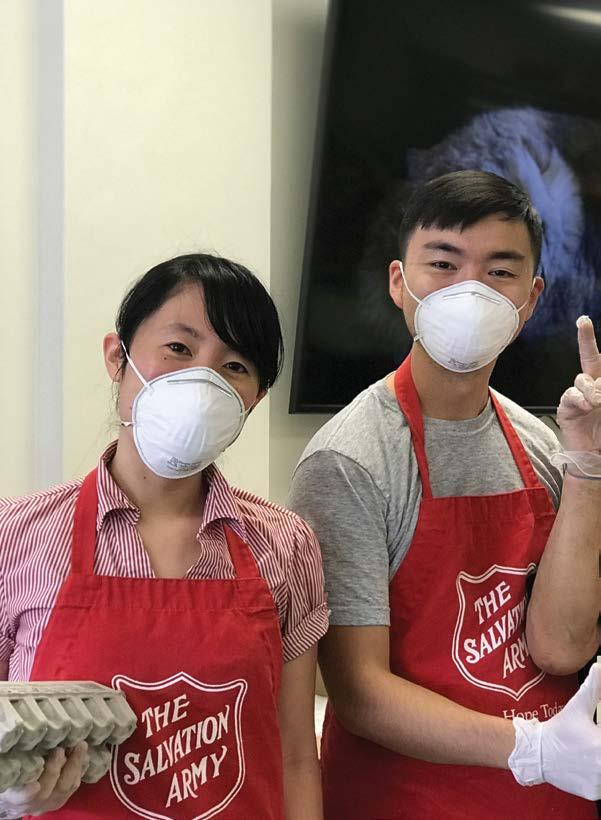
3 minute read
Message from the Divisional Commander
Lt. Colonel Jamie Braund
Lt. Colonel Ann Braund
Advertisement
MESSAGE FROM THE DIVISIONAL COMMANDER
Finding hope during a difficult year
This past year has been unlike any other we have experienced as officers and staff in The Salvation Army. In British Columbia—and around the world—people grappled with COVID-19 while trying to manage their day-to-day lives, ourselves included. The devastation and uncertainty of it all has driven many into hardship, while others remained resilient.
At The Salvation Army, we did what we always do: we kept our doors open to serve those in need… and the need was great. In some areas we experienced an increase for services that far outpaced anything we’ve ever tried to manage. Shelter and community meal programs saw an increase in demand, which exceeded 200–300 per cent in some communities. People who were once gainfully employed found themselves in our food lines, while others sought help through our shelters.
On top of the hardships people faced due to the pandemic, in British Columbia we were and are also fighting one of the worst healthcare crises in our history. People are dying on our streets in the thousands due to tainted drug supplies. With the pandemic limiting our abilities to serve those battling addictions, at times we felt helpless. But in the face of adversity, our staff across the province never wavered and they rose to the challenge. We kept our doors open and our programs and services running to serve those battling addictions. While we had to reduce our capacity in some areas, we remained steadfast in our commitment to serve.
But we did not do this work alone. We received an incredible outpouring of generosity from British Columbians and Canadians. Everyone from individual donors to the corporate community to provincial and federal government. We are truly blessed to have received the type of support that enabled us to serve our communities. We even partnered with other non-profit agencies—thank you Union Gospel Mission and the Christian Leadership group—to ensure those in our communities who needed support, received support.
As we look ahead to the coming year, we do it with optimism. As people get vaccinated and we begin to return to some sort of normalcy, we will use the lessons learned to improve our program and service delivery, while creating efficiencies to make your dollar go even further.
Lt. Colonel Jamie Braund, Divisional Commander
Mission Statement Core Values
2 2
Message from the Divisional Commander 3 COVID-19 Response 6 Lower Mainland 7 The Vancouver Harbour Light Project 8 Moving to Canada Alone 9 Family Food Hampers 10 Vancouver Island 11 Creating a Pathway to Hope 12 Food for Life 13 Serving the Mount Waddington Region 14 Your Impact at Work 15 Continuum-of-Care 17 Red KettleCampaign 18 The Interior 19 Welcoming People to West Kelowna 20 Keeping the Faith 21 Building a Family Connection 23 Building Capacity 24 Northern Region 25 Food Share in The Nisga’a Nation 26 Caring for the Community They Love 27 Anti-HumanTrafficking 28 Emergency Disaster Services 30

The Salvation Army is an international Christian organization that began its work in Canada in 1882. Outside of the government, we are the largest direct provider of social services in the country. Our programs and services feed, clothe and shelter vulnerable people every day, while helping others escape violence and addiction. Working in 400 communities across Canada and more than 130 countries around the world, we give people hope today… and every day.
IN BRITISH COLUMBIA
The Salvation Army in opened its doors in British Columbia in 1887. For over 130 years, we have provided practical, compassionate support to individuals and families in need, regardless of race, disability, sexual orientation, gender identity, age, or religion. Operating in close to 60 communities across the province, we are supported by private, public, and government funding, which helps pay for programs and services such as transitional housing and emergency shelters, community feeding programs, addiction treatment and rehabilitation, long-term and palliative care, after-school programs, summer camps, and our Emergency Disaster Services program.










